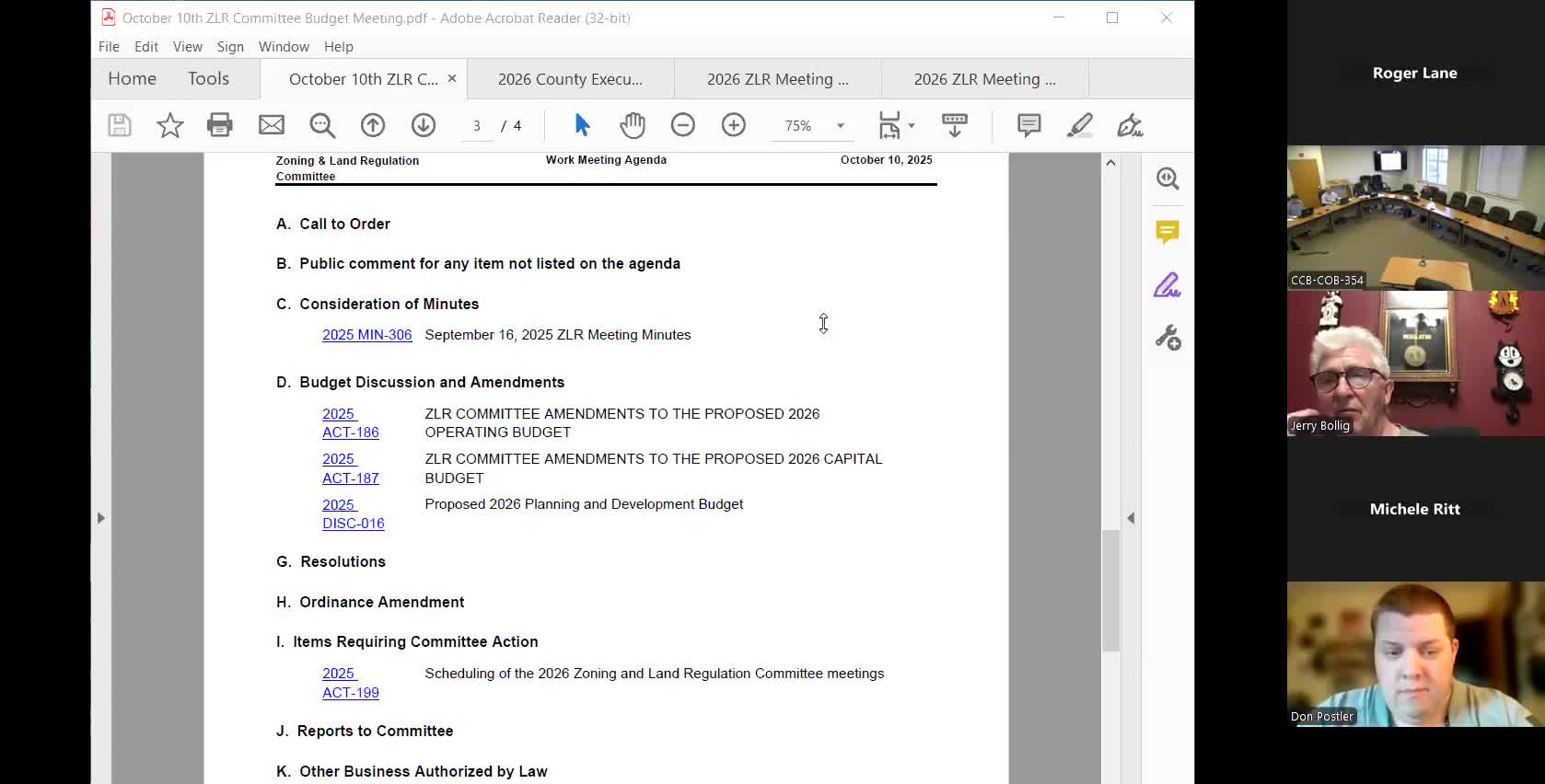Dane County planning staff cuts reduce capacity for regional housing work, committee told
Get AI-powered insights, summaries, and transcripts
Subscribe
Summary
The Zoning and Land Regulation Committee heard that Dane County Planning and Development met a 4% reduction target largely by eliminating two positions and cutting a vehicle capital request, measures staff said will reduce technical assistance to smaller municipalities on housing policy and comprehensive plans.
Chair Doolin called the Zoning and Land Regulation Committee to order and confirmed a quorum. "All committee members are present. Excellent. We have a quorum," Doolin said.
Planning and Development Director Todd Violante told the committee the department met a 4% reduction target for the proposed 2026 operating budget by eliminating contractual project help and reducing staff. "Our reduction goal was $140,000 and 60% of that reduction came from eliminating a contractual arrangement we have with the UW's Department of Planning and Landscape Architecture for 2 project assistance. That was an amount of about $81,000 for 2026," Violante said. He added the remainder of the cut came from eliminating half of a three-year project position and that the executive's budget would remove an additional half of that project FTE as well as a recently vacant housing planner position created in the 2024 budget.
Violante also told the committee the capital request for a new zoning vehicle was reduced from $65,000 in the department submittal to $40,000 in the executive's proposal, with staff explaining the lower amount was expected to still secure a reasonable vehicle though perhaps not the higher-end alternative-fuel pickup they had preferred.
Senior Planner Olivia Perry described how the staffing reductions would affect technical assistance for smaller municipalities outside Madison. "The primary folks that I work with are the cities and villages outside the city of Madison. And of those 23 municipalities, less than half are eligible, because they have outdated comprehensive plans," Perry said, explaining that eligibility for certain state funding requires an updated housing chapter in a municipality's comprehensive plan.
Committee members raised concerns about the loss of capacity to help towns and small villages update comprehensive plans, apply for state housing funds, and to advance the county's regional housing strategy. Several supervisors said the cuts risked leaving smaller jurisdictions without the technical help they need to qualify for state programs or to plan for workforce housing. Violante and Perry repeatedly noted the difference between vacant positions and filled posts — the now-eliminated planner had been vacant since summer — and explained that the county executive's office prioritized cuts to vacancies as part of responding to a structural budget shortfall.
Perry said she was pursuing private fundraising to cover part of a three-year project position that had been partly funded by grants and private contributions; she described meetings scheduled with American Family Insurance and Baker Tilly and said some foundations had expressed interest. She estimated the remaining gap for the privately funded portion was roughly in the low tens of thousands of dollars but gave several ranges while explaining fundraising was ongoing and not guaranteed.
Committee members asked about alternative financing options and whether capital funds or other departmental grants could be used to preserve project positions; staff said capital funds generally cannot be used for personnel and that some human-services grants do not transfer in a way that would fund Planning's positions. Violante said budget amendments could add funding later in the year if new money became available.
The committee received the staff report and discussed a related administrative item: the proposed 2026 meeting schedule for the Zoning and Land Regulation Committee. Staff described adjustments to avoid conflicts with holidays and the partisan primary; no formal vote to adopt the schedule is recorded in the transcript.
Actions recorded during the meeting included approval of the Sept. 16, 2025 meeting minutes and a motion to adjourn. The minutes approval was moved by Supervisor Kronig and passed by voice vote; a motion to adjourn by Anton Cronin was noted and recorded as unanimous.
Committee members and staff characterized the staffing reductions as a loss of momentum for the regional housing strategy and a significant reduction in hands-on technical assistance for small municipalities. Staff emphasized that budget amendments remain an available path if funding or private contributions materialize later in the fiscal year.
